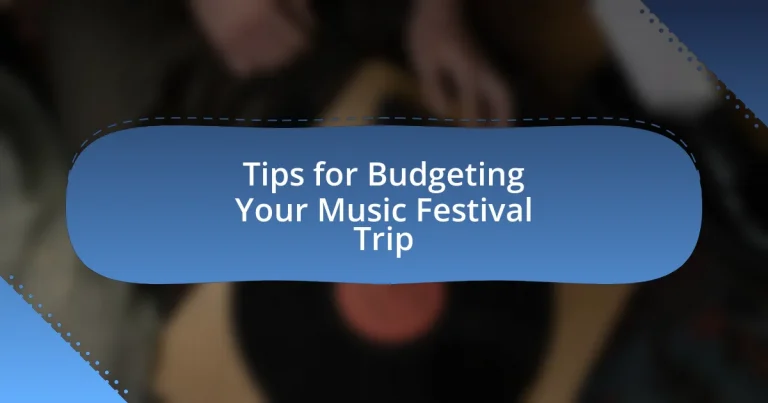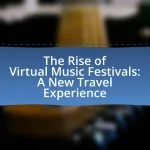The article focuses on essential tips for budgeting a music festival trip, highlighting key considerations such as transportation, accommodation, festival tickets, food and beverages, and additional expenses. It provides guidance on estimating total costs, identifying major expenses, and accounting for unexpected costs. Strategies for sticking to a budget, tracking expenses, and utilizing budgeting tools are discussed, along with tips for finding discounts and managing food and drink expenses. The article emphasizes the importance of setting a budget to enhance the overall festival experience while minimizing financial stress.
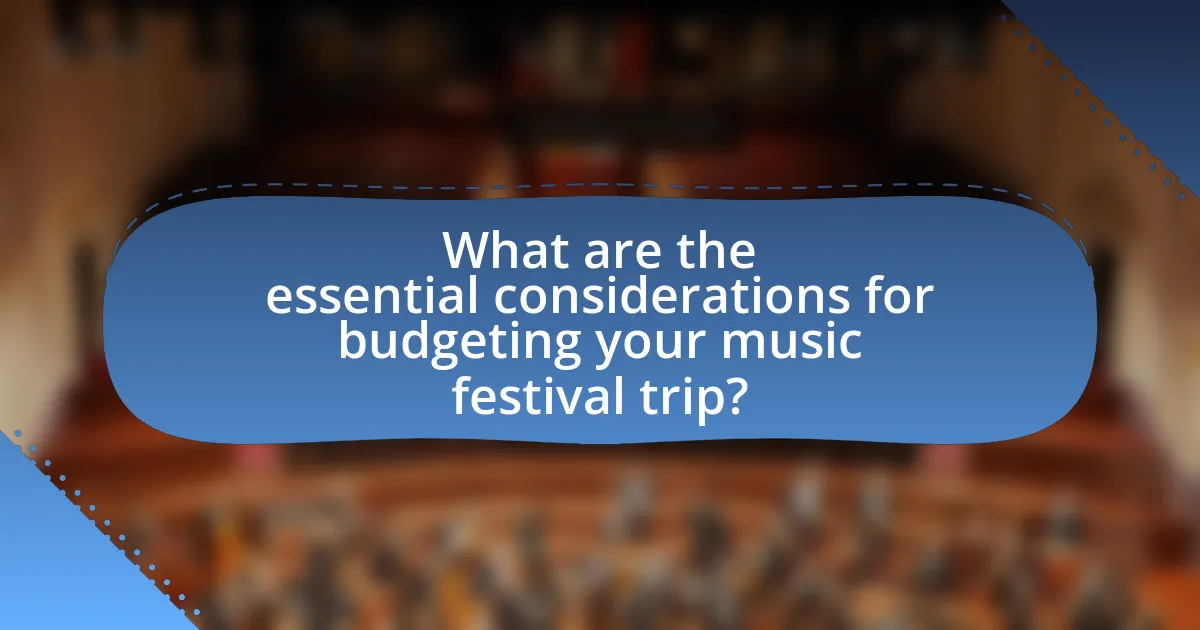
What are the essential considerations for budgeting your music festival trip?
The essential considerations for budgeting your music festival trip include transportation, accommodation, festival tickets, food and beverages, and additional expenses such as merchandise and activities. Transportation costs can vary significantly based on distance and mode of travel, while accommodation options range from camping to hotels, impacting overall expenses. Festival tickets often have tiered pricing, so purchasing early can save money. Food and beverages at festivals can be expensive, so budgeting for meals or planning to bring your own can help manage costs. Lastly, setting aside funds for merchandise and other activities ensures a comprehensive budget that covers all aspects of the trip.
How can you estimate the total cost of attending a music festival?
To estimate the total cost of attending a music festival, calculate expenses including ticket prices, travel costs, accommodation, food, and additional fees. Ticket prices vary widely based on the festival’s popularity and location, often ranging from $100 to $500. Travel costs depend on the distance and mode of transportation, with average round-trip airfare in the U.S. around $300. Accommodation can range from $50 for camping to $200 per night for hotels. Food expenses typically average $10 to $15 per meal, leading to a total of $30 to $45 per day. Additional fees may include parking, merchandise, and activities, which can add another $50 to $100. By summing these estimates, attendees can arrive at a comprehensive budget for the festival.
What are the major expenses to include in your budget?
The major expenses to include in your budget for a music festival trip are tickets, accommodation, transportation, food, and merchandise. Tickets typically represent the largest upfront cost, often ranging from $100 to several hundred dollars depending on the festival. Accommodation expenses can vary widely, with options including camping, hotels, or rentals, generally costing between $50 to $300 per night. Transportation costs, whether for gas, flights, or public transit, should also be factored in, averaging around $50 to $200 depending on distance and mode of travel. Food expenses can accumulate quickly, with daily costs averaging $30 to $60 per person for meals and snacks. Lastly, merchandise purchases, such as clothing or memorabilia, can add an additional $20 to $100 to the overall budget. These categories encompass the essential financial considerations for attending a music festival.
How can you account for unexpected costs during the trip?
To account for unexpected costs during a trip, travelers should allocate a contingency budget, typically 10-20% of the total trip expenses. This approach allows for flexibility in managing unforeseen expenses such as medical emergencies, travel delays, or additional accommodation needs. Research indicates that travelers who set aside a contingency fund are better equipped to handle financial surprises without derailing their overall budget, as highlighted in a study by the American Express Global Business Travel.
Why is it important to set a budget before planning your trip?
Setting a budget before planning your trip is crucial because it helps manage expenses and ensures that you do not overspend. A well-defined budget allows travelers to allocate funds for transportation, accommodation, food, and activities, which can prevent financial stress during the trip. According to a survey by the American Express Global Business Travel, 60% of travelers reported that having a budget significantly improved their travel experience by reducing anxiety related to unexpected costs.
How does a budget help in making informed decisions?
A budget helps in making informed decisions by providing a clear overview of available financial resources and anticipated expenses. This clarity allows individuals to prioritize spending, ensuring that essential costs, such as tickets and accommodations, are covered while also identifying areas where savings can be made. For example, a well-structured budget can reveal that allocating funds for transportation may require cutting back on food expenses, thus facilitating strategic choices that align with overall financial goals.
What are the risks of not having a budget for your festival trip?
Not having a budget for your festival trip increases the risk of overspending and financial stress. Without a clear financial plan, attendees may impulsively purchase tickets, accommodations, food, and merchandise, leading to unexpected expenses that exceed their means. Research indicates that individuals who do not budget are more likely to incur debt; a study by the National Endowment for Financial Education found that 60% of Americans do not track their spending, which can result in financial instability. Additionally, the lack of a budget can lead to missed opportunities for savings, such as early bird ticket prices or package deals, ultimately diminishing the overall experience of the festival.
What strategies can you use to stick to your budget?
To stick to your budget for a music festival trip, create a detailed budget plan that outlines all expected expenses, including tickets, travel, accommodation, food, and merchandise. This strategy ensures that you allocate specific amounts to each category, preventing overspending. Research indicates that individuals who use a written budget are 50% more likely to stay within their financial limits compared to those who do not. Additionally, track your spending in real-time using budgeting apps or spreadsheets, which can help you adjust your spending habits as needed and maintain awareness of your financial status throughout the trip.
How can tracking your expenses help you stay within budget?
Tracking your expenses helps you stay within budget by providing a clear overview of your spending habits. This visibility allows you to identify areas where you may be overspending and adjust accordingly. For instance, a study by the National Endowment for Financial Education found that individuals who track their expenses are more likely to adhere to their budgets, as they can see real-time impacts of their financial decisions. By regularly monitoring your expenditures, you can make informed choices that align with your budgetary goals, ultimately leading to better financial management during events like music festivals.
What tools or apps can assist in budgeting for your trip?
Tools and apps that can assist in budgeting for your trip include Mint, YNAB (You Need A Budget), and Trail Wallet. Mint allows users to track expenses and set budgets in real-time, providing a comprehensive overview of financial health. YNAB focuses on proactive budgeting, helping users allocate funds for specific categories, which can be particularly useful for festival-related expenses. Trail Wallet is designed specifically for travelers, enabling users to log expenses and monitor their budget while on the go. These tools are effective because they offer features tailored to managing travel finances, ensuring users can stay within their budget during their trip.
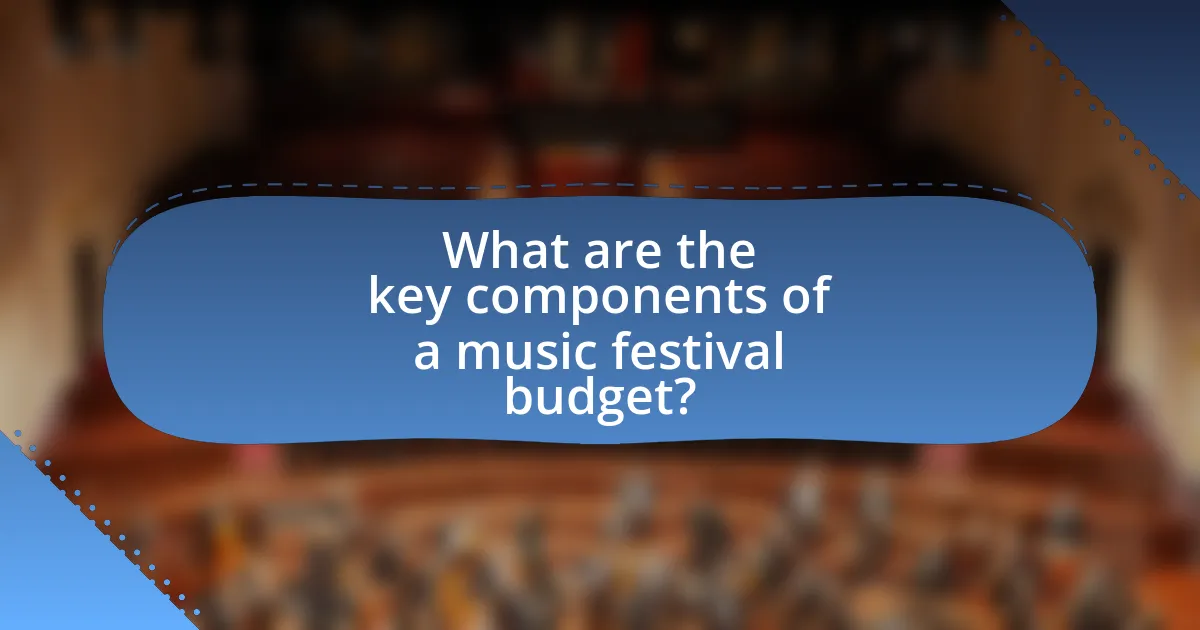
What are the key components of a music festival budget?
The key components of a music festival budget include venue costs, artist fees, production expenses, marketing and promotion, staffing, permits and insurance, and miscellaneous expenses. Venue costs encompass rental fees for the location, while artist fees cover payments to performers. Production expenses involve sound, lighting, and staging equipment. Marketing and promotion costs are necessary for advertising the festival, and staffing includes wages for security, volunteers, and other personnel. Permits and insurance are essential for legal compliance and risk management, and miscellaneous expenses account for unforeseen costs. Each component is critical for ensuring the festival’s financial viability and overall success.
How do ticket prices vary and what should you consider?
Ticket prices for music festivals vary based on factors such as the festival’s location, lineup, duration, and ticket type. For instance, early bird tickets are typically cheaper than last-minute purchases, with some festivals offering discounts for multi-day passes or group purchases. Additionally, VIP tickets often come at a premium, providing enhanced experiences like exclusive access or amenities. According to a 2022 survey by Festicket, ticket prices can range from $100 to over $500, influenced by the popularity of the artists performing and the overall demand for the event. When budgeting for a music festival trip, consider these price variations, along with potential additional costs such as travel, accommodation, and food, to ensure a comprehensive financial plan.
What factors influence the cost of festival tickets?
The cost of festival tickets is influenced by several key factors, including the festival’s location, lineup of artists, duration, and amenities offered. Festivals held in major cities typically have higher ticket prices due to increased demand and operational costs. The lineup of artists significantly impacts ticket prices, as well-known performers can drive up costs; for example, festivals featuring headliners like Beyoncé or Ed Sheeran often charge premium prices. The duration of the festival also plays a role, with multi-day events generally costing more than single-day festivals. Additionally, the amenities provided, such as VIP access, camping options, and food and beverage offerings, can further increase ticket prices. These factors collectively determine the overall pricing strategy for festival tickets.
How can you find discounts or early bird pricing for tickets?
To find discounts or early bird pricing for tickets, regularly check official festival websites and subscribe to their newsletters. Many festivals offer early bird tickets at reduced prices, which are often available for a limited time. Additionally, follow the festival’s social media accounts, as they frequently announce promotions and special offers. Websites like Eventbrite and Ticketmaster also provide options to filter for discounted tickets. Research shows that early bird tickets can save attendees up to 30% compared to standard pricing, making it a financially savvy choice for festival-goers.
What transportation options should you budget for?
You should budget for several transportation options when planning your music festival trip. These options typically include airfare for long-distance travel, rental cars for local mobility, public transportation such as buses or trains for cost-effective travel, and rideshare services like Uber or Lyft for convenience. According to the Bureau of Transportation Statistics, in 2020, 92% of Americans used personal vehicles for travel, indicating that budgeting for car rentals or fuel costs is essential. Additionally, considering local transportation options can save money and enhance your overall experience at the festival.
How can you choose the most cost-effective travel method?
To choose the most cost-effective travel method, compare the total costs of different transportation options, including fares, fees, and additional expenses like parking or baggage. For instance, a study by the American Public Transportation Association found that public transit can save travelers up to 45% compared to driving, especially when factoring in fuel and parking costs. Additionally, consider booking in advance and using fare comparison websites to identify the cheapest options available.
What are the hidden costs associated with transportation?
Hidden costs associated with transportation include fuel expenses, maintenance fees, tolls, parking charges, and potential wear and tear on vehicles. For instance, fuel prices can fluctuate significantly, impacting overall travel costs. Maintenance fees arise from regular servicing and repairs needed for vehicles used for transportation. Tolls and parking charges can add unexpected expenses, especially in urban areas or near event venues. Additionally, using personal vehicles can lead to depreciation, which is a cost often overlooked when budgeting for trips. These factors collectively contribute to the total cost of transportation beyond just the initial ticket or fare.
What accommodation choices can impact your budget?
Accommodation choices that can impact your budget include the type of lodging selected, such as hotels, hostels, vacation rentals, or camping options. Hotels typically offer more amenities but come at a higher price, while hostels provide budget-friendly shared accommodations. Vacation rentals can vary widely in cost depending on location and size, and camping is often the most economical choice, especially near festival grounds. According to a survey by Statista, the average cost of a hotel room in the U.S. was approximately $130 per night in 2021, while hostel prices can start as low as $20 per night, demonstrating the significant cost differences among these options.
How do different types of lodging affect overall costs?
Different types of lodging significantly affect overall costs by varying in price, amenities, and location. Hotels typically offer higher rates due to services and convenience, with average nightly costs ranging from $100 to $300, depending on the city and festival proximity. In contrast, hostels provide budget-friendly options, often costing between $20 and $50 per night, appealing to travelers seeking affordability. Vacation rentals can fluctuate widely, averaging $75 to $250 per night, influenced by size and location. Camping, often the cheapest option, may incur fees around $10 to $30 per night, but can save on transportation and food costs. Thus, the choice of lodging directly impacts the total expenses incurred during a music festival trip.
What are the pros and cons of camping versus hotels?
Camping offers a cost-effective and immersive experience in nature, while hotels provide comfort and convenience. Camping typically requires lower expenses, as fees for campsites are generally cheaper than hotel rates, allowing festival-goers to save money. Additionally, camping fosters a sense of community among festival attendees, enhancing the overall experience. However, camping may involve discomfort due to weather conditions, lack of amenities, and limited privacy. In contrast, hotels offer climate control, private bathrooms, and other amenities that enhance comfort but often come at a higher price. Ultimately, the choice between camping and hotels depends on individual preferences for budget, comfort, and experience.
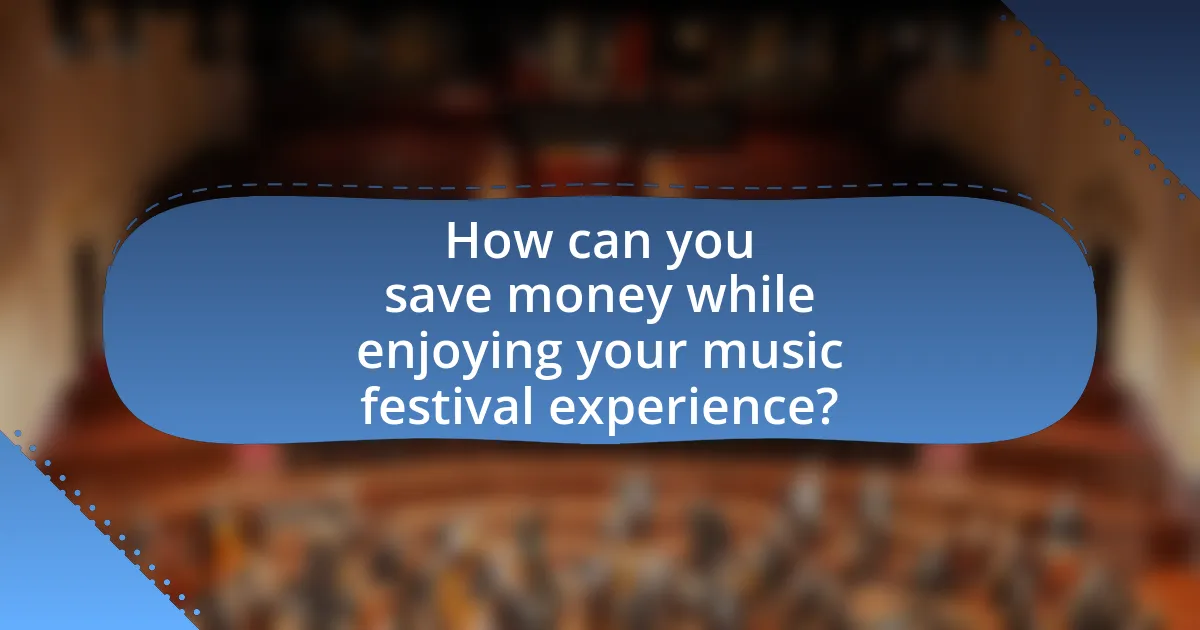
How can you save money while enjoying your music festival experience?
To save money while enjoying your music festival experience, consider purchasing early bird tickets, which can be significantly cheaper than last-minute prices. Early bird tickets often provide discounts of up to 30% compared to regular ticket prices, allowing festival-goers to allocate more funds for other expenses. Additionally, camping on-site instead of booking hotels can reduce accommodation costs, as many festivals offer affordable camping options. Bringing your own food and drinks can further cut down on expenses, as festival vendors typically charge high prices for meals and beverages. By planning transportation in advance and using public transit or carpooling, attendees can also save on travel costs. These strategies collectively enhance the festival experience while maintaining a budget-friendly approach.
What are some tips for reducing food and drink expenses at festivals?
To reduce food and drink expenses at festivals, attendees should consider bringing their own snacks and beverages, as many festivals allow sealed water bottles or small food items. This approach can significantly lower costs, as festival food and drink prices are often marked up by 50% or more compared to regular retail prices. Additionally, purchasing food and drinks in bulk or sharing larger portions with friends can further minimize expenses. Research indicates that festival-goers who plan their meals and set a budget for food and drink tend to spend 30% less than those who do not.
How can meal prepping or bringing snacks help your budget?
Meal prepping or bringing snacks can significantly help your budget by reducing food costs during events like music festivals. By preparing meals in advance or packing snacks, individuals can avoid the high prices of food vendors, which can often charge two to three times more than grocery store prices. For instance, a study by the USDA found that meal prepping can save families an average of $1,200 annually by minimizing impulse purchases and food waste. This approach not only ensures healthier eating options but also allows for better control over spending, making it a practical strategy for budget-conscious festival-goers.
What are the benefits of purchasing drinks in advance?
Purchasing drinks in advance offers significant financial savings and convenience during music festivals. By buying drinks ahead of time, festival-goers can often take advantage of lower prices compared to on-site purchases, where prices may be marked up significantly. For instance, pre-purchased drink packages can reduce costs by up to 20% compared to festival prices, allowing attendees to allocate their budget more effectively. Additionally, having drinks ready eliminates the need to wait in long lines at vendors, enhancing the overall festival experience by maximizing time spent enjoying performances rather than queuing.
How can you find free or low-cost activities during the festival?
To find free or low-cost activities during the festival, utilize local event listings, social media platforms, and festival websites that often highlight budget-friendly options. Many festivals provide a schedule of events that includes free performances, workshops, and community activities. For instance, checking platforms like Facebook Events or local tourism websites can reveal additional activities that may not be widely advertised. Additionally, engaging with festival-goers on forums or social media can uncover insider tips on free events and activities.
What types of events or activities are often free at music festivals?
Many music festivals offer free events and activities such as workshops, art installations, and community gatherings. Workshops often include sessions on music production, dance, or instrument playing, allowing attendees to engage without a fee. Art installations provide visual experiences that enhance the festival atmosphere and are typically accessible to all. Community gatherings, including meet-and-greets or discussions, foster social interaction and are usually free, encouraging participation from festival-goers. These offerings not only enrich the festival experience but also help attendees manage their budgets effectively.
How can you connect with other festival-goers for shared experiences?
To connect with other festival-goers for shared experiences, actively participate in social media groups or festival-specific apps designed for attendees. These platforms often facilitate discussions, event planning, and meet-ups, allowing individuals to find others with similar interests. For instance, many festivals have official Facebook groups or dedicated hashtags on Twitter and Instagram where attendees can share tips, coordinate plans, and arrange to meet up during the event. Engaging in these online communities enhances the likelihood of forming connections and sharing experiences with fellow festival-goers.
What are the best practices for managing your budget during the festival?
To effectively manage your budget during the festival, establish a clear spending limit before attending. This involves calculating total expenses, including tickets, food, transportation, and merchandise, and then allocating specific amounts to each category. Research indicates that festival-goers who set a budget are 30% less likely to overspend compared to those who do not plan their finances. Additionally, tracking daily expenses using a budgeting app can help maintain awareness of spending habits, ensuring that you stay within your predetermined limits.
How can you set daily spending limits to avoid overspending?
To set daily spending limits and avoid overspending, first, determine your total budget for the music festival and divide it by the number of days you will attend. This calculation provides a clear daily spending limit. For example, if your total budget is $600 for a 3-day festival, your daily limit would be $200.
Next, track your expenses daily using budgeting apps or a simple spreadsheet to ensure you stay within your limit. Research shows that individuals who actively monitor their spending are 30% more likely to adhere to their budget. Additionally, consider using cash for daily expenses, as studies indicate that people tend to spend less when using cash compared to credit or debit cards. By implementing these strategies, you can effectively manage your spending and enjoy your festival experience without financial stress.
What should you do if you exceed your budget while at the festival?
If you exceed your budget while at the festival, immediately assess your remaining funds and prioritize essential expenses. This means cutting back on non-essential purchases such as merchandise, food, or drinks that are not necessary for your enjoyment of the festival. Additionally, consider finding free activities or areas within the festival to enjoy, as many festivals offer complimentary entertainment or experiences. According to a survey by Eventbrite, 70% of festival-goers reported that they found ways to enjoy the event without overspending by utilizing free resources available at the venue.
